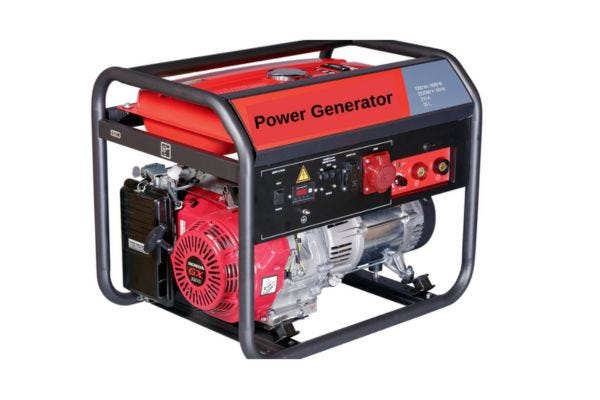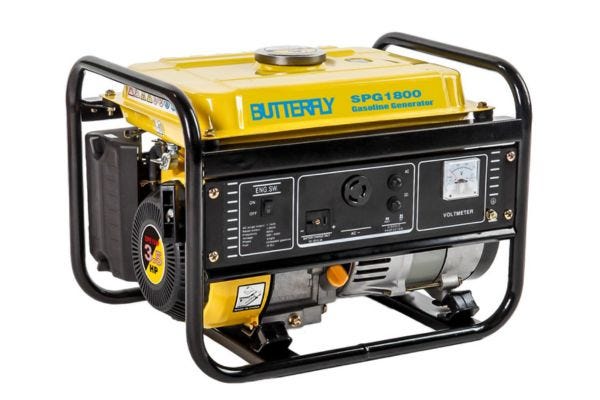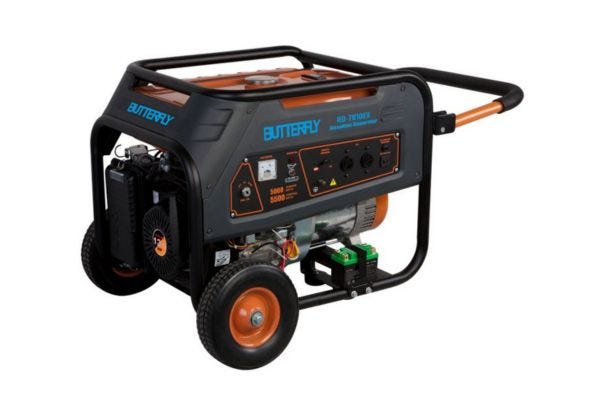

Sudden power cut-offs are annoying and bad for electrical devices. It may cause damage to valuable home appliances and hamper the routine work of family members.
Hence, home generators are essential in Bangladesh for recurrent power outages, day and night. A backup generator ensures continuous power supply for your apartment or office during load-shedding. It helps you power your emergency devices and improves your quality of life.
However, proper generator maintenance is crucial for extending the lifespan and performance of the generator. Indifference about maintaining your generator can lead to decreased performance, costly repairs, and even complete generator failure.
Here we have arranged a complete guide to maintaining the generator. Let’s start.
Considerable Factors During Generator Purchase
The first step to getting better performance from the generator is selecting the ideal generator. You must consider several factors, such as capacity, fuel types, and noise level, to purchase the right one.
Whether the generator is for home power backup or a camping trip you must consider the below factors before purchasing.


1. Generator Capacity
The first step is to determine the necessary total power output. This involves calculating the wattage of the appliances and devices you intend to run together. Consider the starting and running wattages of the devices during the calculation. Some appliances need extra power when starting. When you know the total wattage you need, you can select the proper wattage of the generator set.
Proper wattage means the generator is not too large or too small. Too large generators may cause electrical system damage, increase operational costs, and decrease efficiency.
On the other hand, a too-small generator may be damaged due to overload or overheating.
For example, imagine you want to run the following appliances during load shedding:
- -One Refrigerator (1200 watts running, 2200 watts starting)
- -One Television (200 watts running)
- -One Laptop (100 watts running)
- =One LED light (50 watts running)
Therefore, the running wattage of all the appliances: 1200 + 200 + 100 + 50 = 1550 watts.
You also need to consider the appliance with the highest starting wattage. Here is the refrigerator at 2200 watts.
Therefore, you need a generator with a minimum capacity of 2200 plus 25 percent extra for reserve capacity.
Total Wattage = 2200 watts + 25% of 2200 = 2750 watts
2. Fuel Type Selection
Fuel selection is important for your generator. Generators typically run on gasoline, diesel, or propane. Every fuel-based generator has its own character.
Petrol generators are common and available. Diesel generators are popular for their fuel efficiency and longevity. Propane generators offer clean-burning fuel and are suitable for indoor use.
3. Portability
Sometimes portability is important for generators. If you require a generator for outdoor activities or need to move it frequently, portability is crucial.
Inverter generators are lightweight and compact. So it is easy to transport. Portable generators with wheels and handles are also convenient for moving.
4. Noise Level Preferences
Consider the noise level of the generator before purchasing because generators vary significantly in noise levels.
Inverter generators are quiet in operation. It is ideal for residential areas or camping trips. Select a low-decibel rating generator to avoid excessive noise.
5. Budget
Generator prices vary depending on the power output, features, and brand. Fix your budget and explore options within that range. Remember, investing in a reliable generator is cost-effective in the long run.
Necessary Maintenance Tips for the Reliability and Longevity of the Generators
Regular maintenance and inspection increase the generator's lifetime. You can prevent potential issues, reduce the risk of breakdowns, and run your generator smoothly through routine maintenance. Following are the essential tips to keep your generator ready for an emergency.
- Regular Inspection and Cleaning: Regular inspection and housekeeping are the keys to the generator's health. Do the below simple tasks to maintain it. Check for leaks, loose connections, or damage Inspect your generator thoroughly for any signs of fuel or oil leaks, loose connections, or visible damage. Address any issues and solve them quickly to prevent further complications.
- Clean the Air Filters and Fuel Systems: Clean or replace the air filters regularly to ensure proper airflow to the engine. Clean the fuel system, including the fuel tank, fuel lines, and carburetor, to secure fuel flow.
- Check the Fuel and oil quality: Fresh fuel and the recommended lube oil are crucial for the generators. Contaminated fuel or bad oil can damage the engine and reduce its lifespan. So regularly check the fuel and oil color and viscosity for any declining signs.
- Lube Oil and Oil Filter Changing: Follow the manufacturer-recommended lube oil and oil filter changing intervals. The usual time to replace the oil is around 50–200 hours of operation. Replace the oil filter with every oil change or as recommended.
Using the wrong oil or filter can affect engine performance and lubrication.
- Battery Maintenance: Check the battery water levels and connections regularly, and fill the battery with distilled water if necessary. Ensure the battery terminal's cleanliness, look for corrosion, and tighten any loose connections for smooth operation.
Maintain proper storage and charging practices when you keep your generator running for a long period. Disconnect the battery and store it in a cool, dry place. Charge the battery after a regular interval to prevent complete discharging.
- Cooling System Maintenance: Maintain proper coolant levels and inspect the radiator fins for any blockages or damage to prevent hindrance to cooling flow.
Inspect the hose pipes and belts for wear and tear and replace any worn or damaged components to prevent cooling system failures.
- Test Runs: Make it a routine to test run your generator for two minutes a day during the winter. This regular exercise will keep your generator in good working condition. It is better to test every day, or at least once a month.
- Annual Professional Servicing: Perform professional checking and servicing of your generator at least once a year.
- Performance Monitoring: Performance monitoring is essential to understand your generator's health. If you identify any issues like bad smells, sounds, vibrations, or load reduction, immediately solve the problem.
- Safety Precautions: Safety is the priority. Always maintain safety precautions during maintenance and checkups. Ensure the generator is off and spare parts are cool during the maintenance.
Follow the Manufactures's Guidelines
Always follow the manufacturer's guidelines provided in the user manual. These guidelines cover safe operation, maintenance procedures, and troubleshooting tips for your generator model.
Generator exhaust contains carbon monoxide(CO). It is a colorless and odorless deadly gas for humans. Always operate the generator in a well-ventilated area and install carbon monoxide detectors to avoid CO dangers.
Place the generator on a stable and level surface to prevent it from falling. Keep the generator dry and protected from rain or water. Do not touch and operate the generator with wet hands or conditions. Keep your children and pets away from the generator.
Ensure proper grounding and electrical connections. It prevents electrical shocks and short circuits. Use heavy-duty and properly rated extension cables and avoid overloading the extension cables or electrical outlets.
Maintain a safety plan and keep a fire extinguisher near the generator.
Troubleshooting and Maintenance of Common Generator Issues
The generator may have trouble and need maintenance. Some common generator issues for troubleshooting and maintenance are:
1. Generator won't start: You may find your generator is not starting suddenly. Don’t panic in this situation. Follow the below steps to troubleshoot and restart.
2. Check the fuel level. Check the fuel level and be sure about the fuel quality. Dirty and burned fuel can cause starting problems.
3. Inspect the spark plugs. A dirty or damaged spark plug can prevent the engine from firing. Clean, re-gap, or replace it if needed.
4. Check the battery. The generator battery is important for initial torque generation. A weak or dead battery cannot provide the electrical power needed to start the generator's engine. Clean, check, and replace the battery if necessary.
5. Check for clogged air filters. A clogged air filter restricts airflow and prevents the engine from starting. Clean or replace the air filter.
6. The fuel valve is off. Turn the fuel valve to the "on" position.
7. Safety feature checking: Check if any safety switches or circuit breakers have tripped.
8. Generator runs but doesn’t generate power: Sometimes your generator may not take the load. Follow this checklist in this situation.
First, check the circuit breakers. A tripped circuit breaker can interrupt power output. Reset the breaker if it's tripped.
Look for loose or damaged wiring. Tighten or repair any faulty connections.
Ensure the control panel switches and settings are correct.
9. Generator overheats: Generator overheating is a common issue. The reasons for generator overheating are a low coolant level, blocked airflow, overloading, a faulty thermostat, less ventilation, and a lack of clearance around the generator.
10. The generator produces unusual noises. Unusual noises are a common incident during generator operation.
If you notice such sounds, Identify the source and reasons for the noise first. Knocking or rattling sounds may arise from loose or worn-out engine components. Tighten or replace any loose or worn-out components to solve it.
Inspect the belts for wear and tear, and replace them if necessary for squealing or grinding noises.
A popping or backfiring sound may occur due to a fuel system or spark plug issue.


Different Types of Generators
There are different types of home generators. Every generator has some specific characteristics. The most popular home generators are inverter, portable, and standby generators.
Inverter generators are fuel-efficient, quiet, and portable. It is popular for home backup, camping, and outdoor events.
Portable generators are more versatile, convenient, and affordable than the inverter type.
Standby generators automatically start when the main power supply is interrupted.
Top-Rated Generator Brands in Bangladesh
Several reputed home generator brands are available in Bangladesh, such as Butterfly, Honda, Yamaha, Suzuki, and Kipor Hyundai.


Visit our House of Butterfly to purchase your affordable generator today. Butterfly Group manufactures the best portable generators. Our support team will help you with selection, setup, and after-sales service.
Generator Price Considerations
Home generator prices in Bangladesh vary depending on the brand, power output, features, and fuel type. It's essential to compare prices from different retailers before purchasing.
High-quality generators are a bit more expensive, but they save money on repairs and replacements in the future.
Tips to Increase the Generator Fuel Efficiency
Generators can consume excess fuel when used frequently or for extended periods. To maximize fuel efficiency choose the right fuel, run the generator at the maximum load, avoid overloading, and perform regular maintenance.
FAQs
1. How do I choose a home generator?
-Calculate the total power consumption. Consider fuel type, fix the budget, ensure portability, consider noise level, and choose a suitable type based on your preferences when choosing a home generator.
2. What are the inverter generator benefits?
-Inverter generators can control the output according to the load demand in your house and reduce fuel consumption.
The inverter generator emits less harmful gas into the environment and creates less noise. These are portable and easy to maintain.
3. What is a petrol generator?
-A generator that consumes petrol as fuel is known as a petrol generator.
4. What are quiet portable generators?
-The generators that create 50–60 decibels of noise during operation are considered quiet generators.
Bottom Line
A home generator is an emergency appliance for houses where load shedding occurs haphazardly. So it is important to maintain this machine carefully. You can prevent common issues, reduce the risk of breakdowns, and maximize fuel efficiency by maintaining the practices outlined in this article.
We hope our guidelines will help you enjoy an uninterrupted power supply during power outages or emergencies. Our effort was to ensure the enjoyment of your life.

